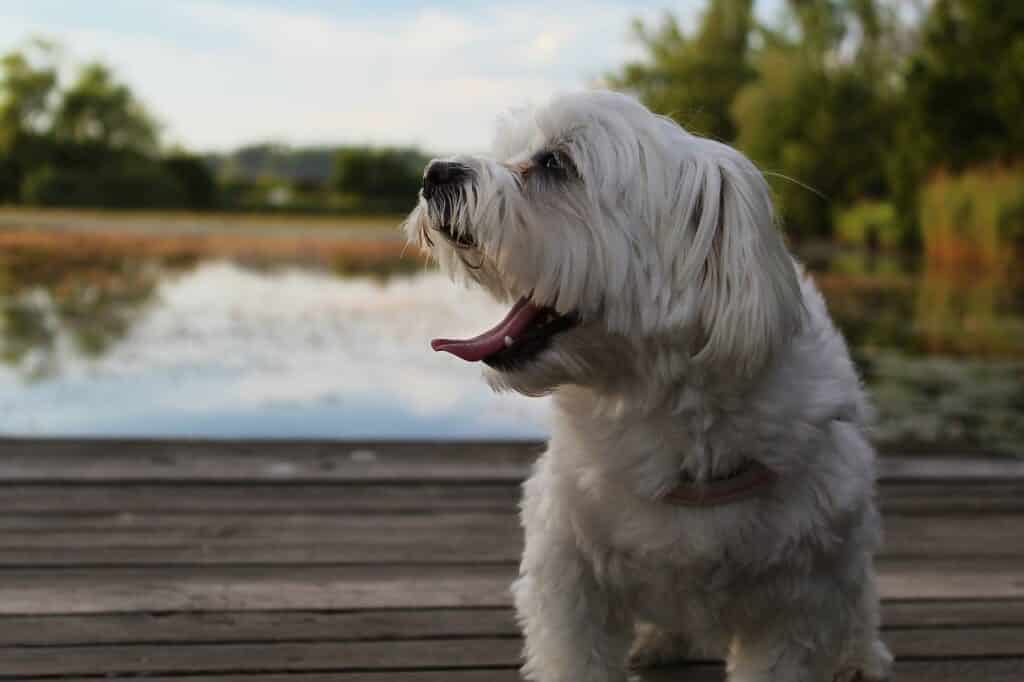You slightly left your coffee on the table and turned to answer the door, only to return and find your furry friend with their head in your cup.
You scold them, and they give you those big puppy dog eyes that make it hard to stay mad, but then you wonder, what is the effect of decaf coffee on dogs?
So, can dogs have decaf coffee?
Dogs shouldn’t drink decaf coffee because it contains traces of caffeine.
While the amount of caffeine in decaf coffee is significantly lower than regular coffee, it’s still enough to potentially cause adverse effects in your pup.
Symptoms of caffeine toxicity in dogs include restlessness, increased heart rate, increased urination, panting, and vomiting.
If you think your dog has consumed too much caffeine, it’s essential to contact your veterinarian immediately.
In this article, we’ll discuss the effects of decaf coffee on dogs, including symptoms of caffeine toxicity and what to do if your dog consumes too much caffeine.

What Happens If My Dog Drinks Decaf Coffee?
Decaf coffee contains small amounts of caffeine, which affects the following organs in dogs:
- The central nervous system
- The cardiovascular system
- The gastrointestinal tract
- The urinary tract.
Let’s discuss how each of the above systems is affected by caffeine.
The Central Nervous System
Although caffeine in decaf coffee is significantly lower than in regular coffee, dogs can still experience adverse effects.
It stimulates the central nervous system (CNS), which leads to restlessness and hyperactivity. In addition, it causes an increased heart rate and panting.
Hyperactive dogs are more prone to accidents and injuries.
For instance, they may run into the street without looking, or jump off a high ledge.
If your dog is normally calm and you notice them acting differently after drinking decaf coffee, it’s important to contact your veterinarian.

The Cardiovascular System
Caffeine also speeds up the heart rate and can cause arrhythmias (irregular heartbeats).
In severe cases, it leads to a heart attack.
If your dog has consumed too much caffeine, it’s essential to monitor their heart rate and contact your veterinarian if you notice any irregularities.
Typically, dogs’ heart rate should be between 60-90 beats per minute; but after drinking decaf coffee, it may increase to over 100 beats per minute.
In puppies and small breeds, the heart rate may increase to 160 beats per minute.
If your dog has a pre-existing heart condition, it may be more susceptible to the effects of caffeine.
In severe caffeine toxicity cases, dogs may experience seizures and collapse.
If you’re concerned about your dog’s cardiovascular system, it’s best to avoid giving them decaf coffee altogether.
The Gastrointestinal Tract
Caffeine also stimulates the gastrointestinal tract, which leads to vomiting and diarrhea.
In addition, it increases the production of stomach acid, which leads to stomach ulcers.
In severe cases, it can even cause gastrointestinal bleeding.
If your dog has consumed too much caffeine, it’s essential to monitor their stool and vomit for any blood or coffee grounds.
If you notice any blood in either, contact your veterinarian immediately.
The Urinary Tract
Caffeine also has a diuretic effect, which means it increases urination.
This leads to dehydration, especially if your dog is already dehydrated from vomiting or diarrhea.
It’s vital to ensure your dog has access to fresh water at all times and avoid giving them decaf coffee altogether.
Symptoms of Caffeine Toxicity in Dogs
If your dog consumes too much caffeine, it may experience the following symptoms:
- Restlessness
- Hyperactivity
- Increased heart rate
- Panting
- Vomiting
- Diarrhea
- Increased urination
- Dehydration.

What Can you do if your Dog Drinks Excessive Decaf Coffee?
When you suspect your dog has had too much decaf coffee, it’s essential to contact your veterinarian right away.
If you have the coffee filter or pod, bring that with you so they can determine how much caffeine your pup consumed.
They will likely want to induce vomiting and give your dog IV fluids to flush the caffeine out of their system.
It’s also important to make sure your dog has access to plenty of water to prevent dehydration.
How Can You Prevent your Dog from Having Decaf Coffee?
The well-being of your furry friend should always be a top priority, so it’s important to take steps to prevent them from consuming decaf coffee.
If you drink decaf coffee at home, keep your pup away from where you’re brewing and drinking it.
It’s also good to keep any coffee pots or mugs out of reach.
If you have guests over who drink decaf coffee, ensure that they don’t give any to your dog.
Could there be Possible Benefits of Decaf Coffee to Dogs?
Dogs shouldn’t drink decaf coffee because of the potential adverse effects of caffeine.
However, its believed that there may be benefits to feeding small amounts of decaf coffee grounds
to dogs.
For instance, it helps with digestive issues and make your dog’s coat shiny.
FAQs
Can sick dogs have decaf coffee?
Sick dogs shouldn’t have decaf coffee because it can exacerbate symptoms and lead to dehydration.
If you’re concerned about your dog’s health, it’s best to consult with your veterinarian before giving them any caffeine.
Is decaf coffee bad for dogs in small amounts?
Decaf coffee is still caffeine, so it’s best to avoid giving it to your dog.
Even in small amounts, it can lead to adverse effects like restlessness, hyperactivity, and increased urination.
Can I give my dog decaf coffee grounds?
Some pet parents choose to add decaf coffee grounds to their dog’s food in moderation.
However, it’s essential to speak with your veterinarian before adding anything new to your dog’s diet.
How much caffeine is in decaf coffee?
The amount of caffeine in decaf coffee varies depending on the type of beans used, the brewing method, and how long it’s been brewed.
However, most decaf coffees have between 0.01% to 0.03% caffeine.
Conclusion
Decaf coffee shouldn’t be given to dogs because it contains small amounts of caffeine which can potentially cause adverse effects.
If you think your dog has consumed too much caffeine, it’s important to contact your veterinarian immediately.
The veterinarian may want to induce vomiting and give your dog IV fluids to flush out caffeine from their system.
- What Dog Breeds Have Pink Skin? - March 24, 2023
- What Are the Most Inspiring Dog Breeding Quotes? - March 20, 2023
- Can Pheromone Spray Help Improve Dog Breeding Results? - March 19, 2023








